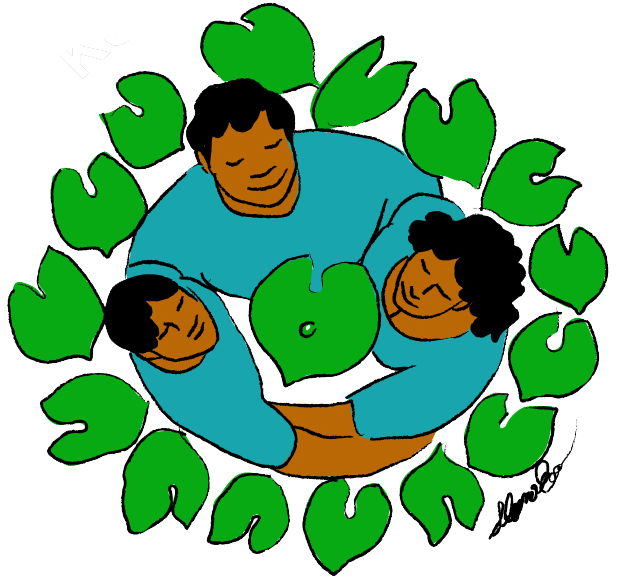Aunty Inno with her father Manny Sound, the former Lieutenant Governor of Chuuk State. Fall of 2018.
The Health Legacy of Lien Apinam
On the other side of yesterday, as its chiefs and warriors had voyaged off to the island of Satawan for a ceremonial meeting, on the shores of the beautiful island of Lukunor an attempted siege by the chief of Etal had ensued. As the battle unfolded, perched a ways off on a hill was a woman, the daughter of the chief of Lukunor whose name was Lien Apinam. As she watched this civil war unfold the only thing going through her mind was if she did nothing, everybody was going to die. In a fury of determination Lien Apinam ran down to that beach, drawing her path directly toward the invading chief. As she ran through the middle of the battlefield, her long brown hair glimmering with tufts of ocean salted, sun-kissed red highlights flying behind her, everyone froze. The sentries blew the conch shells announcing the poise of a woman on the battlefield - her mere presence enough to stop a war. Reaching the Etal chief, Lien Apinam fell before him and begged him to end this battle. Understanding the implications of her presence here, the chief looked upon Lien Apinam in frustration. Having drawn his attention, she stood before him proudly and unwaveringly said “if you know the culture, and if I, a woman, mean anything to you, let my people go.” And so, he did. There was no war and everything was good.
Hearing the ever-present echoes of ancestors, the descendants of Lien Apinam still tell her story as her lessons reverberate in their lives today. For Auntie Innocenta Sound-Kikku, a direct descendant of Lien Apinam, reiterations of those lessons on Lukunor’s shore had resurfaced in her time on the other side of Oceania on the shores of Oahu. In the late 1990’s, following an immigration reform that changed the status of Micronesian immigrants to Micronesian migrants, the US Congress stripped Pacific Islander migrants of their access to Medicaid. Thereafter, under the Lingle administration in Hawaii, COFA (Compact of Free Association) migrants were transitioned from Medicaid onto the basic health plan, cutting down the assistance the Micronesian community depended on greatly for healthcare. As Aunty Inno recounts the journey forward, she shares with us her Lien Apinam moment.
During the first hearing at the state capital “our elders literally begged the department of health at that time, and I remember my dad...my dad was speaking at that time and I remember him saying - if they move forward with this change in the health insurance for our people then our family needs to prepare to put him six feet under. And in my mind, I’m thinking - over my dead body. Not on my watch. and I made a vow in that space and time that I will do whatever it takes to work and figure out how to do this.” And just like her ancestor before her, this strong, proud Chuukese woman set out to use her voice to save her people. With the collaboration of many including KKV, Medical Legal Partnership, Appleseed, community elders and youth, government leadership, along with a plethora of health coalitions and community organizations across the country, in December of 2020, more than two decades after the immigration reform that threatened so many lives, the US Congress announced their plans to restore Medicaid access to COFA migrants which include citizens of the Federated States of Micronesia, the Republic of the Marshall Islands, and the Republic of Palau.
In light of this hopeful news, as Aunty Inno puts it, there is still more work to be done. The advocacy for health equity among all ethnic groups and the push for everyone to have a seat at the decision-making table must continue on well into the following generations. To our youth, Aunty Inno shares this message:
“…my hope for the next generation is for them to take part in making this matter…this generation, especially this generation now, you have a voice because you can vote…The reason why we all leave the safety net of our own place is basically for healthcare and that is the number one reason a lot our people leave our own place…So I want the youth to really learn our history. Learn what really happened to our people. And even understand all the strategic work that has been done before today…They need to know what they need to do to step it up. In this generation where my children are able to vote because now they have a voice - it’s going to be them…They will be the one. They can now apply for offices in the state. They can make the changes just like the other immigrants or migrants that came before us.”





